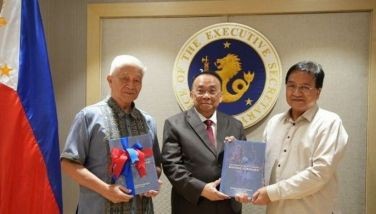My celebrity anecdotes
MANILA, Philippines - What does being a celebrity really mean? According to different dictionaries, a celebrity is a well-known person, a star, luminary, famous, infamous, popular, a personality, idol, somebody, renown, a success story, has a name, is prominent, has prestige, has distinction, notable, publicly acclaimed and glorified.
What is there to celebrate in celebrities? Why do people extol them? Is it because something endeared them to their fans? Or is it because others would look for popular personalities to become their role models? Either way, people must have found certain qualities or traits in these celebrities they admire and love.
I, myself, became a celebrity without intending to be one. I acquired an image of sorts when I tried experimenting doing things I loved doing. I took up Theater Arts in college because I loved acting. I became an actor on stage, film and television, appearing in bit roles in movies like Moises Arcangel with Eddie Garcia and in a telenovela titled Valiente where I played the role of a mayor.
I also wanted to sing and I ended up joining a band called WADAB singing our hit song Pagtumatagal Lalong Tumitibay. I’ll start my celebrity anecdotes with my own personal experience.
One day I went to a magazine stand to buy a song hit magazine where our group was featured on its cover. When I was about to pay for some copies, the sales girl not recognizing who I was said that she has a crush on one of the members of WADAB. Sensing that I was the one, I asked her to point which one she has a crush on. She pointed at my picture and I excitedly told her that I was that guy. She looked at me quizzically and looked at the picture again. She commented, “You’re only handsome in pictures and not in person.” Anyway, I was still happy even after hearing her unflattering remark.
Lea Salonga’s mom one day asked me to accompany them to a TV station. While waiting for her cue, we sat and shared stories around a small, round stage, with her brother Gerard. Unknowingly, a Fresnel light hanging from the batten fell and landed close to where Lea was seated. Somebody could have been killed because of that accident. Whenever I see Lea now, I couldn’t help but recall that almost unfortunate incident.
I met Rico J. Puno before he became a star. Usually after TV appearances, he’d ask me to accompany him to the gate of the station to hail a taxicab. Months later and several gold record awards to his name, after a party in Malacañang, hosted by then Pres. Ferdinand and Imelda Marcos, he asked me once again to accompany him, not anymore to get a cab, but to his brand-new Mercedes Benz.
We can’t really judge anyone as passé or down and out. After being rejected by several record companies, Mae Rivera came to see me to audition her album. Many commented that her singing style was baduy or downright targeted for the masses among other negative things said about her.
When I signed her up, the song Aray became a hit and sold double-platinum. Everyone
changed perception of her overnight.
Cooky Chua was a shy student of Butch Albarracin. While singing in a piano bar, she stopped abruptly and headed for the exit. We asked what went wrong and why she was crying. She saw her mom enter and confessed that her parents disapproved of her singing. We apologized to her mom and promised that we will not let her continue singing. Surprisingly, the mom gave her blessings upon learning that she was a very good singer.
In a UST singing contest where Jamie Rivera joined, she missed her cue on the first line of her song. She stopped and asked the judges composed of Jose Mari Chan, me, and others, that she be given another chance. We agreed and eventually she won the contest. I wanted to sign her up but we had too many talents already. I recommended her to OctoArts Records and she immediately was signed up and later joined Miss Saigon as Kim.
When Marc Velasco, singer-composer of the hit Ordinary Song, submitted his audition tape to Sony Music, he didn’t leave a phone number or address. I immediately fell in love with the songs and kept playing them hoping that the singer will call or show up. After more than a year, Perf de Castro, the renowned guitar virtuoso, sent me a tape to audition. It was exactly the same album I was listening to. I rushed to Hobbit House where I learned Marc was performing.
I met Sharon Cuneta when she was just 12 and not yet a star. She was to guest in a TV show but said she couldn’t leave the house because she had no car to take her to the station. Her uncle Tito Sotto told
her yaya to take a cab to Vicor. When they arrived, I borrowed a make-up kit from an officemate so we could put make-up on her while I drove her to the station. I fondly remember her when she’d call me her yayo.
Sharon and Rey Valera, the composer of Mr. DJ, were not in the priority list in our record company then. Some said that Sharon was too young and Rey didn’t have star quality. Since I believed in their potential, I did underground promotions and within two weeks their songs became big hits. I was reprimanded because I promoted them without the knowledge of the department. I was fired and my car was repossessed.
I had this experience of bringing back and forth at least four times to the airport and hotel Mary McGregor because she was a chance passenger. You can just imagine the frustration after waiting so long and be informed that she can’t board the plane.
I also had the chance to meet Beyoncé, Kelly Rowland and Michelle Williams when they were still known together as Destiny’s Child in Phuket, Thailand. Unfortunately during that time, they couldn’t perform because Beyoncé had throat problems.
I had a chance to watch Celine Dion in Brisbane, Australia in 1996. After watching her superb performance, we, Sony Music execs, were invited to her birthday celebration and mini presscon backstage. I even helped other guests have their CDs signed since I acted as moderator of the event.
One morning a guy claiming he was John McVie of the Fleetwood Mac called me. He said he saw my name and picture in the papers. To cut it short, he came and the moment I was convinced he was
John, I booked him in a TV noontime show. We brought him back to Los Baños later where he was vacationing with his brother-in-law and we were surprised to see a lot of fans wanting to meet him after seeing him in the TV show.
The first time Stephen Bishop came to Manila, he didn’t have any concert or an album to promote. He came here for personal reasons which I can’t share. I was assigned by my record company to be with him wherever he wanted to go for one week. We’d go around bars and video arcades and people were surprised when I mentioned his name to them. “Are you the real Stephen Bishop?”, they’d ask.
When I was still with WEA Records, my boss asked me if could accompany our visiting international jazz group Manhattan Transfer to buy some souvenirs. Sure I said. And I brought them to Ils de Tuls. Where is that? Ilalim ng tulay sa Quiapo. Judging from the smiles on their faces, I knew they really enjoyed the experience.
One thing nice about working in the advertising and promotions department of a record company is the chance to meet international stars like Rupert Holmes. I took him around Manila when he guested in TV shows. We had lunch and dinner together talking as if we were old friends. When he learned that I also tried composing, he wrote in his album “To Tato, the greatest composer in the world.” Signed Rupert Holmes.
After the concert of Maureen McGovern, we took her to Pagsanjan Falls where we rode a banca and shot the rapids. Later, we took her to Lake Caliraya where we rented a speed boat. Well, lifestyle of the rich and famous.
Isaac Hayes rode with me in my car on the way to the Folk Arts Theater because the members of his entourage went ahead. The guard in the artists’ entrance stopped my car since I didn’t have a car pass. I angrily told the guard that if he’ll not let us in, he’d better look for a costume and perform by himself. Realizing that my companion was the real Isaac Hayes, he apologized, gave a shaky salute and let us in.
I remember that time when the Sandpipers rode in my car from a TV guesting on the way back to their hotel. My car suffered a flat tire in the middle of a busy street somewhere in Sampaloc, Manila. It was a sight watching an international popular group fix a flat tire under a scorching afternoon sun.
When I was working then with Vicor promoting his Anak album, Freddie Aguilar got an invitation to perform in Bataan. I told him I didn’t trust bringing my car all the way there. “No problem,” he said. He rented a black limousine and we sat at the back of the limo and enjoyed the ride in the fashion of how rock stars did it.
When Asin, a folk group from Mindanao, was interviewed on radio, I noticed that they were not comfortable. Later, I asked them what their problem was since I knew they were good in Tagalog based from the beautiful Tagalog lyrics they’ve written on their songs. Their secret, they told me, was the fact that they referred often to the English-Tagalog dictionary for the right choices of words.
After a decade, nobody thought Andrew E would be big again. He brought his latest album to several record companies and was turned down. I was the last one he talked to but didn’t let me listen to his album. He just rapped some of the songs live and to his surprise I told him I’ll sign him up. Andrew E‘s albums under Sony Music became multi-platinum sellers. By the way, one of the hit songs in his album was Banyo Queen.
Many recording artists did not like some of their hit songs for whatever reason. The late Bella Tan of Universal Records questioned my decision in not signing up Cooky Chua’s band Color It Red when their song Paglisan became a hit. I showed her the demo tape they submitted and pointed to her that that song was not included. Up to now, Cooky doesn’t like to sing that song for unknown reasons.
The same case with Noel Cabangon. I insisted that if ever I sign him up, he should include Kanlungan (Panapanahon). In his album produced by the Jesuit Communication, he did include it and the song became a big hit but only after several years since we last talked.
Some unfortunate misses I experienced in the recording scene was when a group featuring three girls called Silk Band auditioned to me. I told their manager to remove one girl because she didn’t blend with the group because of her R&B vocal style. She opted to go solo but I still couldn’t take her in because she sounded like Mariah Carey, who was our bestselling international artist in Sony Music then. Nevertheless, Nina, her name, became a very popular R&B artist.
Seven years earlier, another R&B female singer was signed up by us under Diamond Star Music and her name was changed by Maricel Soriano and Manny Valera to Jasmine Arroyo. I was hired by Sony Music and left without finishing her project. Seven years later, she joined the Metropop singing competition. I still couldn’t sign her up because she too sounded very much like Mariah Carey. Her new name? Kyla.
Marco Sison at first didn’t like his hit song Make Believe, saying that there was something wrong with the lyrics.
The CompanY, a jazz pop group, recorded a song in its first album titled Everlasting Love which they didn’t like to promote because it wasn’t jazzy enough. They didn’t even like the title. I told their producers that that was the only song in the album that was going to be a hit and the words “Everlasting Love” are what people will remember. True enough, it became a hit and they had to record another song which sounded the same to be their follow-up single.
Jojo Alejar hated me then for forcing him to sing Reality and Boulevard, both cover songs which became big hits.
In Jenine Desiderio’s case, it was the opposite. I told her I was going to sign her up if she was willing to do a Tagalog adaptation of the song Superwoman titled Hindi Ako Si Darna, written by Jojo Alejar. She said yes without any hesitation and did a wonderful rendition of it.
(Editor’s Note: Tato Malay is a veteran radio/TV broadcaster and a recording executive for more than 30 years, handling varied positions such as artist and repertoire manager, marketing manager and record producer in Sony Music Phils., WEA Records, Universal Records and Vicor Music Corp. He is also an author of the book Lessons I Never Learned in School and an anchor of Kamalayan Radio Program weekdays at 4 p.m. over DZME 1530KHz.)
- Latest
- Trending


































